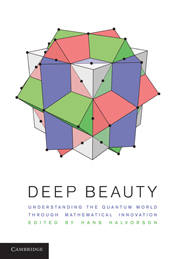Book contents
- Frontmatter
- Contents
- Contributors
- Preface
- Acknowledgments
- Introduction
- I Beyond the Hilbert Space Formalism: Category Theory
- II Beyond the Hilbert Space Formalism: Operator Algebras
- III Behind the Hilbert Space Formalism
- 9 Quantum Theory and Beyond: Is Entanglement Special?
- 10 Is Von Neumann's “No Hidden Variables” Proof Silly?
- 11 Foliable Operational Structures for General Probabilistic Theories
- 12 The Strong Free Will Theorem
- Index
9 - Quantum Theory and Beyond: Is Entanglement Special?
from III - Behind the Hilbert Space Formalism
Published online by Cambridge University Press: 01 June 2011
- Frontmatter
- Contents
- Contributors
- Preface
- Acknowledgments
- Introduction
- I Beyond the Hilbert Space Formalism: Category Theory
- II Beyond the Hilbert Space Formalism: Operator Algebras
- III Behind the Hilbert Space Formalism
- 9 Quantum Theory and Beyond: Is Entanglement Special?
- 10 Is Von Neumann's “No Hidden Variables” Proof Silly?
- 11 Foliable Operational Structures for General Probabilistic Theories
- 12 The Strong Free Will Theorem
- Index
Summary
Introduction
The historical development of scientific progress teaches us that every theory that was established and broadly accepted at a certain time was later inevitably replaced by a deeper and more fundamental theory of which the old one remains a special case. One celebrated example is Newtonian (classical) mechanics, which was superseded by quantum mechanics at the beginning of the last century. It is natural to ask whether in a similar manner there could be logically consistent theories that are more generic than quantum theory itself. It could then turn out that quantum mechanics is an effective description of such a theory, only valid within our current restricted domain of experience.
At present, quantum theory has been tested against very specific alternative theories that, both mathematically and in their concepts, are distinctly different. Instances of such alternative theories are non-contextual hidden-variable theories [1], local hidden-variable theories [2], crypto-nonlocal hidden-variable theories [3, 4], or some nonlinear variants of the Schrödinger equation [5–8]. Currently, many groups are working on improving experimental conditions to be able to test alternative theories based on various collapse models [9–14]. The common trait of all these proposals is to suppress one or the other counterintuitive feature of quantum mechanics and thus keep some of the basic notions of a classical worldview intact. Specifically, hidden-variable models would allow us to preassign definite values to outcomes of all measurements; collapse models are mechanisms for restraining superpositions between macroscopically distinct states, and nonlinear extensions of the Schrödinger equation may admit more localized solutions for wave-packet dynamics, thereby resembling localized classical particles.
- Type
- Chapter
- Information
- Deep BeautyUnderstanding the Quantum World through Mathematical Innovation, pp. 365 - 392Publisher: Cambridge University PressPrint publication year: 2011
- 62
- Cited by



